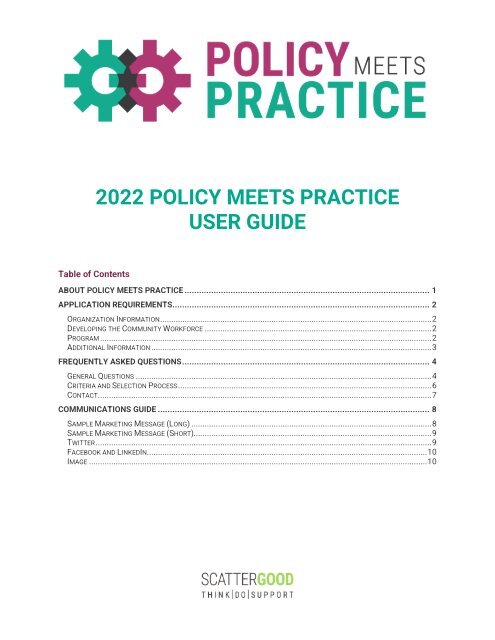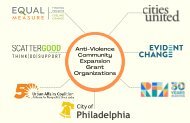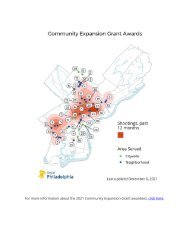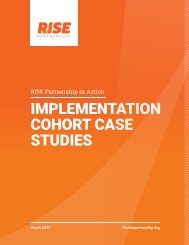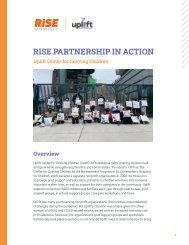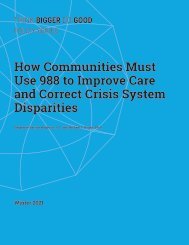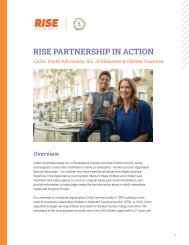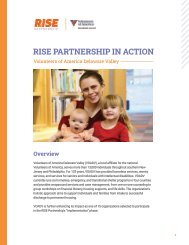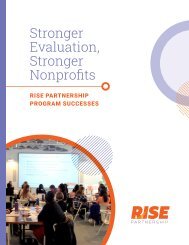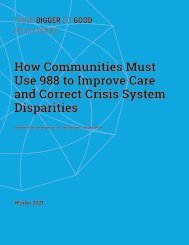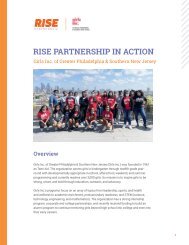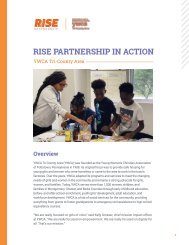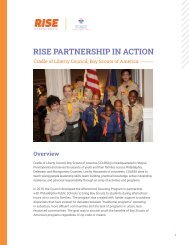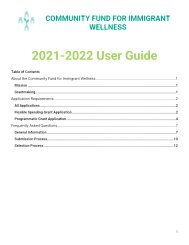2022_Policy Meets Practice_User Guide
You also want an ePaper? Increase the reach of your titles
YUMPU automatically turns print PDFs into web optimized ePapers that Google loves.
<strong>2022</strong> POLICY MEETS PRACTICE<br />
USER GUIDE<br />
Table of Contents<br />
ABOUT POLICY MEETS PRACTICE ..................................................................................................... 1<br />
APPLICATION REQUIREMENTS.......................................................................................................... 2<br />
ORGANIZATION INFORMATION .......................................................................................................................... 2<br />
DEVELOPING THE COMMUNITY WORKFORCE ...................................................................................................... 2<br />
PROGRAM ..................................................................................................................................................... 2<br />
ADDITIONAL INFORMATION .............................................................................................................................. 3<br />
FREQUENTLY ASKED QUESTIONS ...................................................................................................... 4<br />
GENERAL QUESTIONS ..................................................................................................................................... 4<br />
CRITERIA AND SELECTION PROCESS .................................................................................................................. 6<br />
CONTACT ...................................................................................................................................................... 7<br />
COMMUNICATIONS GUIDE ................................................................................................................ 8<br />
SAMPLE MARKETING MESSAGE (LONG) ............................................................................................................ 8<br />
SAMPLE MARKETING MESSAGE (SHORT)........................................................................................................... 9<br />
TWITTER ....................................................................................................................................................... 9<br />
FACEBOOK AND LINKEDIN .............................................................................................................................. 10<br />
IMAGE ........................................................................................................................................................ 10
ABOUT POLICY MEETS PRACTICE<br />
<strong>Policy</strong> and practice must work in tandem to drive critical systems changes. The Think Bigger Do<br />
Good <strong>Policy</strong> Series provides policy solutions to our nation’s most pressing behavioral health<br />
issues. Though public policy has broad and deep impacts for families and communities, public<br />
policy discussions often occur without those most affected at the table.<br />
The Scattergood Foundation is offering grant awards that will align our Think Bigger Do Good<br />
<strong>Policy</strong> Series with our local grantmaking. The grant program, <strong>Policy</strong> <strong>Meets</strong> <strong>Practice</strong>: Think<br />
Bigger Do Good Support Local, will invest in organizations that work directly with communities<br />
to address issues that relate to, inform, and advance the policy discussions outlined in the<br />
series. Goals of the program include:<br />
• Investing in programs that connect important behavioral health policy issues to on-theground<br />
practice;<br />
• Building capacity of small- and mid-size organizations; and<br />
• Informing behavioral health policy discussions using lessons from real-world<br />
application.<br />
In its second cycle of grantmaking, the program will support organizations to develop the<br />
community behavioral health workforce. As outlined in Enhancing the Capacity of the Mental<br />
Health and Addiction Workforce: A Framework by Benjamin F Miller, PsyD and Anita Burgos, PhD,<br />
the need for mental health and addiction care outpaces our current mental health and addiction<br />
workforce. In the wake of the COVID-19 pandemic, mental health providers are more in demand<br />
than ever. Historically, workforce efforts have focused on increasing the number of clinical<br />
mental health and addiction providers. Peers and other nontraditional community workers have<br />
the potential to fill a significant gap in behavioral health care while also creating opportunities<br />
for individuals with lived experience. The Scattergood Foundation will support organizations to<br />
develop their community mental health workforce, thereby enhancing access to care.<br />
A total of four $50,000 grant awards will be given. <strong>Policy</strong> <strong>Meets</strong> <strong>Practice</strong> grantees will carry out<br />
programs during the course of the grant year from July 1 st , <strong>2022</strong> to June 30 th , 2023. Grantees<br />
will also participate in a Community of <strong>Practice</strong> to share best practices and challenges, and<br />
engage in dialogue about implications for public policy. Our hope is that these convenings will<br />
provide rich learning opportunities for grantees, funders, and the network of policy experts who<br />
have been involved in the Think Bigger Do Good <strong>Policy</strong> Series.<br />
For more information and to apply, click here.<br />
1
APPLICATION REQUIREMENTS<br />
Applicants will be asked to provide the following information in the <strong>Policy</strong> <strong>Meets</strong> <strong>Practice</strong><br />
application, which can be accessed through our online grant portal.<br />
Organization Information<br />
1. Information that will be included as a part of the Foundant Profile Information:<br />
o Organization Name<br />
o Organization EIN<br />
o Contact Information: Address, Phone Number, Email Address, Website<br />
2. 501(c)(3) Status/Fiscal Sponsorship<br />
3. Leadership Information<br />
o Executive Director Name and Email Address<br />
o Board Chair Name and Email Address<br />
4. Organization Mission Statement<br />
5. Annual Budget<br />
6. Representative Leadership: Please describe how your organization’s leadership team<br />
and board is representative of the community you work with.<br />
Developing the Community Workforce<br />
The goal of this grant program is to reinforce strategies outlined in the Think Bigger Do Good<br />
<strong>Policy</strong> Paper, Enhancing the Capacity of the Mental Health and Addiction Workforce: A<br />
Framework by Benjamin F Miller, PsyD and Anita Burgos, PhD. Recommendations are made on<br />
three levels – clinical, community, and individual.<br />
For the purposes of this grant, we are seeking to support programs that expand the community<br />
behavioral health workforce by investing in peers and other nontraditional community workers.<br />
Community mental health workers can divert care from an overextended clinical workforce by<br />
delivering interventions that focus on prevention, recovery, mitigation, and/or harm reduction.<br />
Existing models that promote the benefits of situating mental, social, and spiritual support<br />
services within the community setting include community health workers/promotoras, peer<br />
support services, and other frontline public health workers. These roles are described in further<br />
detail in the policy paper, Enhancing the Capacity of the Mental Health and Addiction Workforce:<br />
A Framework by Benjamin F Miller, PsyD and Anita Burgos, PhD.<br />
Program<br />
7. Program Name<br />
8. Amount Requested: Please provide your grant amount request. Organizations can seek<br />
up to $50,000 in funding.<br />
2
9. Service Population: Please describe the population your organization intends to work<br />
with. Please include demographic information, location of services, and community<br />
strengths and assets. Please also include information about the behavioral health issue<br />
you are seeking to address.<br />
10. Program Description: Please describe your program. In your description, please<br />
address the following:<br />
• Will the funding be used for a new or existing program?<br />
• How the community behavioral worker(s) will address behavioral health needs<br />
• How the community behavioral health worker(s) are identified by your<br />
organization<br />
• How the community behavioral health worker(s) are trained<br />
• How the community behavioral health worker(s) are integrated into the broader<br />
programming of the organization (i.e. where and how they will practice, how they<br />
are supervised)<br />
11. Job Description: Please provide a draft job description for a community behavioral<br />
health worker(s).<br />
NOTE: Please include information about hours and whether the community behavioral<br />
health worker(s) will be employed part-time or full-time.<br />
12. Budget: Please provide a program budget and budget narrative.<br />
NOTE: A critical aspect of supporting the community mental health workforce is that<br />
workers are adequately compensated for their time and expertise. Please submit a budget<br />
that reflects wages appropriate for these roles.<br />
13. Three outcomes of interest: Please include three outcomes you hope the program<br />
achieves. Example outcomes include:<br />
• Improved attitudes toward mental health help-seeking<br />
• Decreased social isolation<br />
• Increased use of coping skills<br />
Additional Information<br />
14. [OPTIONAL] 988: With the implementation of the new 3-digit number, 988, for the<br />
National Suicide Prevention Lifeline and Veteran’s Crisis Line quickly approaching, has<br />
your organization explored its relationship to 988? If so, can you expand upon how your<br />
organization will be involved and how you believe it will impact your workforce?<br />
15. [OPTIONAL] Supplemental Information: Is there anything else you would like to say to<br />
support this application?<br />
NOTE: You may answer this question in writing or by providing a link to a video clip, audio<br />
clip, photos, or another medium of communication. The intention of this question is to<br />
provide organizations with an additional opportunity to share about their program using<br />
whatever communication tool feels right for them.<br />
3
FREQUENTLY ASKED QUESTIONS<br />
General Questions<br />
1. What is the deadline to submit an application?<br />
The deadline for submission is Monday, May 16 th , <strong>2022</strong> at 5pm EST.<br />
2. Who is eligible to submit an application?<br />
Organizations that meet all of the following criteria are eligible to apply:<br />
• Non-Profit Organization: The organization is recognized as tax-exempt under<br />
Section 501(c)(3) of the Internal Revenue Code or has a Fiscal Sponsor.<br />
• Geographic Location: The organization serves communities located within<br />
the city of Philadelphia.<br />
• Small- or mid-size organization: The organization has an annual budget of<br />
$5million or less.<br />
• Not an Existing Grantee: The organization is not currently a grantee of the<br />
Scattergood Foundation.<br />
• Representative Leadership: The organization’s leadership team and board is<br />
representative of the community they work with.<br />
• <strong>Policy</strong> <strong>Meets</strong> <strong>Practice</strong>: The program is aligns itself with recommendations<br />
made in the Think Bigger Do Good paper of focus, Enhancing the Capacity of<br />
the Mental Health and Addiction Workforce: A Framework by expanding the<br />
community behavioral health workforce.<br />
3. Can current grantees of the Scattergood Foundation apply?<br />
We will not be accepting applications from current Scattergood Foundation grantees.<br />
This includes grantees of the Community Fund for Immigrant Wellness.<br />
4. Is there a fee to submit an application?<br />
No, there is no fee associated with submitting an application.<br />
5. Is the award limited to a geographic area?<br />
Organizations must be located within the city of Philadelphia.<br />
6. How much will the grant awards be?<br />
Organizations can apply for up to $50,000.<br />
4
7. What is the timeline for the <strong>2022</strong> <strong>Policy</strong> <strong>Meets</strong> <strong>Practice</strong> grant program?<br />
Date<br />
Event<br />
Wednesday, April 13 th , <strong>2022</strong> <strong>Policy</strong> <strong>Meets</strong> <strong>Practice</strong> grant opportunity launched to the public<br />
Monday, April 18 th at <strong>Policy</strong> <strong>Meets</strong> <strong>Practice</strong> webinar for grant opportunity Q&A<br />
3pm EST<br />
To register for the webinar, click here. The webinar will also be recorded and posted on the Scattergood<br />
Foundation’s website for your convenience.<br />
Monday, May 16 th 5pm EST Application period closes<br />
May/June <strong>2022</strong><br />
Scattergood staff and Grantmaking Group review applications<br />
June <strong>2022</strong><br />
Grant awards announced<br />
Grant awards released<br />
July <strong>2022</strong> – June 2023 Grantees implement programs and convene<br />
*The Scattergood Foundation reserves the right to change any of the above dates. All changes will be posted online.<br />
8. What is expected of <strong>Policy</strong> <strong>Meets</strong> <strong>Practice</strong> grantees?<br />
<strong>Policy</strong> <strong>Meets</strong> <strong>Practice</strong> grantees will carry out programs during the course of the grant<br />
year. Grantees will also be expected to participate in a total of three convenings over<br />
the course of the grant year to discuss how their programs are going, share best<br />
practices and challenges, and engage in dialogue about implications for public<br />
policy.<br />
Our hope is that these convenings will provide rich learning opportunities for<br />
grantees, funders, and the network of policy experts who have been involved in the<br />
Think Bigger Do Good <strong>Policy</strong> Series.<br />
9. How can organizations submit an application?<br />
Submissions can be made through our online grant portal, which can be found at<br />
https://www.grantinterface.com/Process/Apply?urlkey=SGF.<br />
No paper applications will be accepted.<br />
5
10. What are the steps for submitting an application?<br />
The steps for submitting an application are as follows:<br />
1. Create a Foundant account for the Scattergood Foundation. If you already<br />
have a Foundant account with the Foundation, log on using your email<br />
address and password. You may access the logon page here.<br />
2. You will then be directed to your Applicant Dashboard. Click on the “Apply”<br />
tab at the top toward the left.<br />
3. You will then see the application titled, <strong>Policy</strong> <strong>Meets</strong> <strong>Practice</strong> <strong>2022</strong>. Click the<br />
“Apply” button on the right side.<br />
4. Complete the application. If you would like to save the application and return<br />
to it, click the “Save Application” button. Once you are ready to submit, click<br />
the blue “Submit Application” button.<br />
If you have any issues using the online platform please do not hesitate to reach out<br />
with questions.<br />
Criteria and Selection Process<br />
11. What criteria will the Grantmaking Group be using to review applications?<br />
A grantmaking group will select organizations to receive grant awards based on the<br />
following criteria:<br />
• Eligibility Requirements: Does the organization/program meet the eligibility<br />
requirements of the <strong>Policy</strong> <strong>Meets</strong> <strong>Practice</strong> grant program?<br />
• Addressing Behavioral Health Needs: How well does the program address<br />
behavioral health needs in their community?<br />
• Hiring Process: What is the process for hiring community behavioral health<br />
workers?<br />
• Training: How well are the community behavioral health workers are trained?<br />
• Integration: How well are the community behavioral health workers<br />
integrated into the broader practice of the organization (i.e. where and how<br />
they will practice, how they are supervised)?<br />
• Impact on Behavioral Health Workforce: What is the program’s potential for<br />
expanding the behavioral health workforce?<br />
• Budget: How well does the budget fit the program needs?<br />
12. Does the program/organization have to implement specific policy recommendations<br />
from the paper?<br />
Yes. We are seeking to support programs that will expand the community behavioral<br />
health workforce through the use of peers and other nontraditional community<br />
workers.<br />
6
13. How will grantees be selected?<br />
Grantees of the <strong>Policy</strong> <strong>Meets</strong> <strong>Practice</strong> program will be selected through a process<br />
that includes initial review by Scattergood Foundation staff and all final selections by<br />
the Grantmaking Group.<br />
14. Who is on the Grantmaking Group?<br />
Please visit http://www.scattergoodfoundation.org/support/policy-meets-practice<br />
learn more about the Grantmaking Group.<br />
15. How will decisions about grant awards be communicated with applicants?<br />
The Scattergood Foundation will manage all communications about grant decisions,<br />
contracting, payments, and reporting via email.<br />
Contact<br />
16. Who do I contact if I have a question about the <strong>Policy</strong> <strong>Meets</strong> <strong>Practice</strong> grant program?<br />
Please direct your questions and comments to Caitlin O’Brien, Director of Learning<br />
and Community Impact, Scattergood Foundation, via email at<br />
cobrien@scattergoodfoundation.org.<br />
7
COMMUNICATIONS GUIDE<br />
We encourage our partners to promote the <strong>Policy</strong> <strong>Meets</strong> <strong>Practice</strong> grant program through various<br />
forms of communication. Please see below for examples of how your organization can support<br />
<strong>Policy</strong> <strong>Meets</strong> <strong>Practice</strong> across different platforms.<br />
Sample Marketing Message (Long)<br />
<strong>Policy</strong> and practice must work in tandem to drive critical systems changes. The Think Bigger Do<br />
Good <strong>Policy</strong> Series provides policy solutions to our nation’s most pressing behavioral health<br />
issues. Though public policy has broad and deep impacts for families and communities, public<br />
policy discussions often occur without those most affected at the table.<br />
The Scattergood Foundation is offering $50,000 grant awards to align the Think Bigger Do Good<br />
<strong>Policy</strong> Series with our local grantmaking. The grant program, <strong>Policy</strong> <strong>Meets</strong> <strong>Practice</strong>: Think<br />
Bigger Do Good Support Local, invests in organizations that work directly with communities to<br />
address issues that relate to, inform, and advance the policy discussions outlined in the series.<br />
Goals of the program include:<br />
• Investing in programs that connect important behavioral health policy issues to on-theground<br />
practice;<br />
• Building capacity of small- and mid-size organizations;<br />
• Informing behavioral health policy discussions using lessons from real-world<br />
application.<br />
In its second cycle of grantmaking, the program will support organizations to develop the<br />
community behavioral health workforce. As outlined in Enhancing the Capacity of the Mental<br />
Health and Addiction Workforce: A Framework by Benjamin F Miller, PsyD and Anita Burgos, PhD<br />
the need for mental health and addiction care outpaces our current mental health and addiction<br />
workforce. In the wake of the COVID-19 pandemic, mental health providers are more in demand<br />
than ever.<br />
The Scattergood Foundation is seeking to support programs that expand the community<br />
behavioral health workforce by investing in peers and other nontraditional community workers.<br />
A total of four grant awards will be given. Each grant award will be for $50,000 and the grant<br />
period will last one year.<br />
Learn More and Apply.<br />
8
Sample Marketing Message (Short)<br />
Aligning policy and practice is critical to drive needed systems changes. The Scattergood<br />
Foundation is offering $50,000 grant awards to align the Think Bigger Do Good <strong>Policy</strong> Series<br />
with our local grantmaking. The grant program, <strong>Policy</strong> <strong>Meets</strong> <strong>Practice</strong>: Think Bigger Do Good<br />
Support Local, invests in organizations that work directly with communities to address issues<br />
that relate to, inform, and advance the policy discussions outlined in the series.<br />
In its second grant cycle, <strong>Policy</strong> <strong>Meets</strong> <strong>Practice</strong> will support organizations that align work with<br />
the paper, Enhancing the Capacity of the Mental Health and Addiction Workforce: A Framework by<br />
Benjamin F Miller, PsyD and Anita Burgos, PhD. Eligible applicants include organizations located<br />
in the city of Philadelphia with an annual budget of $5million or less.<br />
Learn More and Apply.<br />
Twitter<br />
Sample Tweets<br />
• We must bridge the gap between policy and practice. Apply to our<br />
#<strong>Policy</strong><strong>Meets</strong><strong>Practice</strong>22 to enhance the behavioral health workforce in #PHL<br />
http://bit.ly/policy-practice<br />
• New opportunity for small- and mid-size orgs in #PHL: Grant application open for<br />
@ScattergoodFdn <strong>Policy</strong> <strong>Meets</strong> <strong>Practice</strong> to develop their community #behavioralhealth<br />
workforce http://bit.ly/policy-practice #<strong>Policy</strong><strong>Meets</strong><strong>Practice</strong>22<br />
• <strong>Policy</strong> must be informed by communities most directly affected. New @ScattergoodFdn<br />
grant program #<strong>Policy</strong><strong>Meets</strong><strong>Practice</strong>22 aims to bridge these gaps and address urgent<br />
needs. Learn more and apply http://bit.ly/policy-practice<br />
Hashtag: #<strong>Policy</strong><strong>Meets</strong><strong>Practice</strong>22<br />
9
Facebook and LinkedIn<br />
Sample Post<br />
In its second cycle of grantmaking, the <strong>Policy</strong> <strong>Meets</strong> <strong>Practice</strong> grant program will support<br />
organizations to develop the community behavioral health workforce. As outlined in Enhancing<br />
the Capacity of the Mental Health and Addiction Workforce: A Framework by Benjamin F Miller,<br />
PsyD and Anita Burgos, PhD, the need for mental health and addiction care outpaces our current<br />
mental health and addiction workforce. In the wake of the COVID-19 pandemic, mental health<br />
providers are more in demand than ever.<br />
The Scattergood Foundation is seeking applications that expand the community behavioral<br />
health workforce by investing in peers and other nontraditional community workers.<br />
A total of four grant awards will be given. Each grant award will be for $50,000 and the grant<br />
period will last one year. Eligible applicants include organizations located in the city of<br />
Philadelphia with an annual budget of $5million or less.<br />
Learn more and apply: http://bit.ly/policy-practice<br />
Image<br />
The logo for the <strong>Policy</strong> <strong>Meets</strong> <strong>Practice</strong> program can be found here.<br />
10


